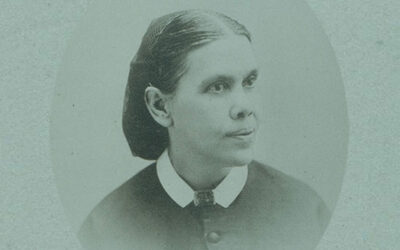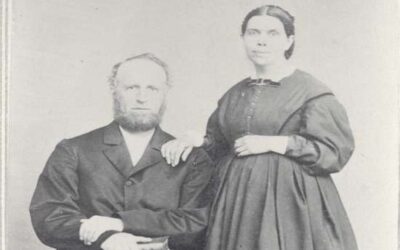Peter’s ladder of virtues is a phrase that refers to eight characteristics to be developed as a person grows in their relationship with Jesus Christ. It can be found in 2 Peter 1.
In short, these Christian virtues are faith, goodness, knowledge, self-control, perseverance, godliness, kindness, and love.
We can all agree that these are excellent principles to live by. But this is supposed to be more than just a list of good things. There’s a reason it’s called a “ladder.”
Let’s look more closely at how Peter listed and explained these principles to the believers he wanted to encourage.
First, let’s go straight to the Bible verses themselves.
The “rungs” on Peter’s ladder of virtues
The book of 2 Peter begins as an encouragement to the early church, most likely including several new converts. He outlines the sincere character development that comes with knowing and following Jesus, showing how these virtues build upon one another in important ways.
“For this very reason, make every effort to supplement your faith with goodness, goodness with knowledge, knowledge with self-control, self-control with endurance, endurance with godliness, godliness with brotherly affection, and brotherly affection with love” (2 Peter 1:5-7, CSB).
These virtues are commonly called a “ladder” because each one naturally follows and supplements the previous one.
The foundation is faith—our common starting point. We acknowledge our desire to believe and grow in Christ, then the Holy Spirit helps us grow from there. And as we grow, each step up this ladder brings us closer to the ultimate ideal of perfect love—the essence of God Himself (1 John 4:8).
Let’s learn more about what each of these virtues truly mean, and how they have a compounding effect on one another.
Faith

Photo by Marcos Paulo Prado on Unsplash
Faith is the first and most important step. Even if it’s a small step, it gets us on the ladder.
Without faith, there would be no sincere progression through all these virtues.
Peter describes how faith enables Christians to partake in the divine nature God promises. We have to make the decision to believe, even if we can’t see how it all fits together yet. That’s how faith works.
According to Hebrews 11:1, it is “the substance of things hoped for, the evidence of things not seen” (NKJV).
In everyday language, it means you are acknowledging God as sovereign and accepting Jesus Christ as the one who saves us, loves us, and guides us through His Holy Spirit.
Faith is how we accept the salvation Jesus offers us. Even if our starting “amount” of belief is as small as a mustard seed (Matthew 17:20-21), that’s all God needs. That’s also how we know that God is the one saving us, not our own efforts.
Ephesians 2:8-9 says,
“For by grace you have been saved through faith, and that not of yourselves; it is the gift of God, not of works, lest anyone should boast” (NKJV, emphasis added).
And it’s good to remember that even though faith is the foundational experience of being a Christian, it might look and feel different for every person. It depends on how we have experienced the world and how we came to accept Jesus.
But after that first step of faith, we can begin to experience a deepening of virtue as we get to know what true “goodness” is all about.
Goodness
Some Bible versions use the word “virtue” itself here, and this principle can also be described as “moral excellence.”1 It’s all about recognizing how God’s Law is perfect and beneficial, and how it sets the right conditions for love to flourish.
While summed up in the Ten Commandments, (Exodus 20:1-17; Matthew 22:35-40), God has given us instructions all throughout the Bible. And making it a priority to follow His Law, even if we mess up at times, cultivates goodness within us. We begin to recognize it more and more as we continually work toward it.
We can see goodness demonstrated by Joseph in the Old Testament. Even though he was bullied, mistreated, neglected, and wrongfully accused and imprisoned (Genesis 37, 39-42), he always did his best to be good to others even while dealing with his own frustrating circumstances.
Knowledge
Faith and goodness grow as we gain further knowledge, or wisdom—which the Bible has a lot to say about.
“Wisdom is the principal thing; therefore get wisdom. And in all your getting, get understanding” (Proverbs 4:7, NKJV).
The idea here is that there is always more to learn. We serve an infinite God who is continuously revealed through Scripture, people, and the world around us.
And by keeping up the pursuit of the knowledge of God, it only adds to all the other aspects of our spiritual development.
Self-control

Photo by cottonbro studio
And as we learn more and more, new challenges and temptations arise as well. That’s where self-control comes in.
Self-control—also called “temperance” in the King James Version—encompasses the principles of moderation, restraint, balance, and using God’s Law to set our boundaries. It is one of the fruits of the spirit the apostle Paul mentions in Galatians 5:22-23.
A person who exercises self-control is better able to fight against the temptations of sin, or letting our actions be motivated by greed, pride, sexual immorality, hate, gluttony, etc.
Self-control doesn’t mean that a person isn’t tempted at all, but that when temptation is experienced, it is also recognized, prayed about, and willfully put aside, with the help of the Holy Spirit.
We can see self-control modeled in various stories in the Bible, such as in the Old Testament with David and King Saul.
Saul had become extremely jealous of David and his abilities—so much so that he intended to kill him. During one of his pursuits of David, Saul rested in a cave, away from his men (1 Samuel 24:3). What Saul didn’t know was that David and his men were also hiding in the back of the same cave.
David’s men saw their opportunity. They tried to convince him that now was the perfect time to kill Saul. After all, God had promised David he would one day be king (1 Samuel 24:4).
David undoubtedly felt the temptation to end that struggle with Saul once and for all. But he knew that wasn’t what God wanted him to do. He knew that Saul’s ultimate fate should be in God’s hands, not his.
So instead of killing him, or even injuring him, David quietly cut off the corner of Saul’s robe (1 Samuel 24:4). He told his men, “The Lord forbid that I should do this thing to my master, the Lord’s anointed, to stretch out my hand against him, seeing he is the anointed of the Lord” (1 Samuel 24:6, NKJV).
Then he felt guilty even of that. Later he confessed to Saul—putting himself in danger to do it—and reminded Saul he could have killed him, but chose not to (1 Samuel 24:11).
By exercising self-control, David allowed everything to happen in God’s timing. Israel later experienced prosperity because David trusted in God, which gave him the willpower and self-control he needed for the tough situations he encountered.
Perseverance/Endurance

Photo by Brian Erickson on Unsplash
As we continue in faith, pursue goodness, and exercise self-control (with God’s help), we develop perseverance.
This trait can also be expressed as steadfastness,2 endurance,3 or patience.4 But all these words express the concept of strength across time. An ongoing process. Consistency. Fighting discouragement and not giving up.
Even when things take a really long time. Even when things get difficult. Even when things seem impossible.
There will be no shortage of challenges for a true Christian. But prayerfully cultivating perseverance will help us get through those struggles—sometimes in ways that amaze us and strengthen our faith.
“And not only that, but we also glory in tribulations, knowing that tribulation produces perseverance; and perseverance, character; and character, hope” (Romans 5:3-4, NKJV).
Perseverance builds character. It’s a key ingredient in a godly Christian character that reflects the love and strength of Jesus Christ.
Naturally, that would lead us toward godliness.
Godliness
This is a significant step of the ladder because it signals a turning point. We’re moving from developing our personal character to actively trying to emulate the character of God.
Godliness comes from the Greek word eusebeia, which means “well worship.”5 Practically, it means deep reverence toward God that motivates action, as well. So this refers to a genuine, profound worship of God that also involves the goal of reflecting His character.
Godliness also requires an understanding of the bigger picture. Our desires start to match God’s desires, and we are less enticed by the frivolous things the world constantly tries to offer.
John the Baptist made a statement that exemplified an interesting angle of godliness:
“He must increase, but I must decrease” (John 3:30, CBS).
And this doesn’t mean we have to “decrease” who we are. This isn’t about identity, but about recognizing God’s perfect will and perfect character, and fixing our minds’ eyes upon Him.
Then, as we embrace and reflect Christ’s character, it will be evident in how we relate with others.
Brotherly kindness

Photo by Zac Durant on Unsplash
Brotherly kindness is just what it sounds like: showing kindness and affection to our brothers and sisters, or our neighbors, in Christ. It means treating everyone like we’re all part of the same family.
It’s often described by the Greek word philadelphia.6
Here’s one way the apostle Paul describes kindness:
“Be kindly affectionate to one another with brotherly love, in honor giving preference to one another” (Romans 12:10, NKJV).
We don’t just look out for ourselves, we also consider the needs and perspectives of others.
This is exemplified in stories like the “Good Samaritan” (Luke 10:25-37), Ruth taking care of Naomi (Ruth 1), and Paul feeding and healing others after being shipwrecked, all while he was a prisoner (Acts 27:9-44, 28:1-10).
So kindness is much more than just “being nice.” Kindness involves compassion, generosity, empathy, and humility.
And as kindness becomes our way of life, God’s love can be revealed through us.
Love
Love is the ultimate expression of the Christian life, represented as the last rung on Peter’s ladder. God is love (1 John 4:8), and Jesus said that showing love is the way to demonstrate that we follow Him.
“By this everyone will know that you are my disciples, if you love one another” (John 13:35, CSB).
And this love is to be shown to everyone, whether they share our beliefs or not. Whether they’re kind to us or not. Even if they’re our enemies (Luke 6:27).
This is the love God has for us. In Greek, it’s called agape, and it can be described as “a giving love, entirely unselfish.”7
This is the type of love that led Jesus to sacrifice His life for each and every one of us—even those who put Him on the Cross—so that we might someday spend our eternal life with Him.
Love encapsulates every other virtue on Peter’s ladder, as we can see from 1 Corinthians 13. This is commonly called the “love chapter” because it describes all the qualities that make up this true love. The chapter ends, “And now abide faith, hope, love, these three; but the greatest of these is love” (1 Corinthians 13:13, NKJV).
God works with us through the Holy Spirit to develop this trait in our lives. And as He does, we also become closer and closer with Him.
Cultivating these eight virtues in life

Photo by Noah Buscher on Unsplash
When Peter laid out the ladder of virtues, he was penning a letter to the early Christian church. He was describing the divine nature of God, and how these qualities were developed and strengthened in a Christian. And how the people’s growth in these virtues would help the Gospel to be shared everywhere.
These qualities are timeless. They’ll never waver in importance, and they’ll always be expressions of Christ’s character.
And in today’s world, torn apart by pride, greed, anger, violence…these things are needed more than ever.
So how do we do this?
None of us are perfect, but we still have the same goal—love.
And the journey toward love can start with just a mustard-seed amount of faith. Once we decide to get on this ladder, the Holy Spirit will help us, step by step, as we go.
Cultivating the virtues of “Peter’s ladder” is a life-long process, no matter when we start it.
And even though it is a very personal, inward process, it isn’t something we can do on our own. It’s a process of growth that happens as we grow closer to God.
And even though it’s portrayed as a ladder, it doesn’t mean that we have to master each step before we can move on to the next. All these virtues build upon one another, but that doesn’t mean we can’t develop our kindness if we’re still working on our faith.
This isn’t a formula or a checklist.
And sometimes, it might be a daily climb we have to do over and over.
On hard days, it might be all we can do just to place our feet on the bottom rung. But even so, that step of faith puts us on the right path and opens our minds to the Holy Spirit, who can lead us upward.
There are also additional things we can do to cultivate these values in our lives.
- We can strengthen our faith by praying and reading the Bible.
- We can practice goodness when we volunteer our time, or even when we stop to help a friend. Or a stranger.
- We can grow our knowledge with Bible study, and by approaching life with a mindset that’s always ready to learn.
- We can exercise self-control by building good habits and setting goals.
- We can develop perseverance by keeping up our devotional practice, even when we lose motivation or get discouraged. And if we do get stuck, we know we can always start things up again, and God will meet us where we’re at.
- We can reflect godliness by prayerfully staying open to the promptings of the Holy Spirit.
- We can practice kindness by intentionally thinking about the people around us, being willing to listen, and helping out whenever an opportunity arises.
- And we experience and grow in love by doing any and all of these things, and keeping our eyes open for how God shows His love with us.
All in all, the closer we draw to God, the more we will be aware of, experience, and emulate these virtues.
It just takes a step of faith to get started.
Looking for more tips to improve your relationship with Jesus?
Related Articles
- 2 Peter 1:5, New American Standard Bible. [↵]
- 2 Peter 1:6, English Standard Version. [↵]
- 2 Peter 1:6, Christian Standard Bible. [↵]
- 2 Peter 1:6, King James Version. [↵]
- “Godliness (2150) eusebeia,” Sermon Index.net, [↵]
- “Philadelphia,”Strong’s, G5360 [↵]
- “Agape,” Cambridge Dictionary, [↵]
More Answers
What Is an Adventist Medical Missionary?
A medical missionary in the Adventist Church is someone who cares for the medical needs of people as a way of showing the love of Jesus. They may travel to another country, or even just serve in their hometown.
Is the Seventh-day Adventist Church Protestant?
With so many Christian denominations, it can be hard to keep track of which ones share which beliefs. Let’s look at the core Protestant beliefs of Adventism.
The True Events Surrounding the Birth of Jesus
Jesus’ birth involved many strange events: a pregnant virgin, a stable birth, angels appearing to shepherds, and wealthy visitors. These help us understand His supernatural yet incredibly humble life.
Are Seventh-day Adventists Evangelicals?
According to its origins and definition, evangelicalism is about following Jesus and the Bible and sharing the Gospel through the way we live our lives. Adventists wholeheartedly harmonize with these principles.
Could Anything Keep Me from Becoming an Adventist?
We are each saved through Christ. But when it comes to church membership, are there certain beliefs or expectations to become an Adventist?
Do Seventh-day Adventists Have “Rules”?
We uphold principles we believe will help us maintain a closer relationship with Jesus and His Word. Learn how these principles guide Adventist lifestyles.
Your Comprehensive List of Ellen G. White’s Visions
Ellen White—an author, health-reform advocate, Bible scholar, and one of the most influential founding figures of the Seventh-day Adventist Church—was blessed by the Holy Spirit with the spiritual gift of prophecy (1 Corinthians 14; Romans 12:6-8). During her lifetime, she received direct guidance and inspiration from God in several different ways.
Do Seventh-day Adventists Have “Rules” For Marriage?
Around the world, many cultures and religions have various marriage traditions, expectations, or even rules when it comes to choosing a partner, planning the wedding, extended family logistics, or a number of other things.
An In-Depth List of the Prophecies About Jesus
How many prophecies of Jesus are in the Old Testament?
Can a Seventh-day Adventist Marry a Non-Adventist?
Yes. Seventh-day Adventists are not under any official rules that dictate who they can or cannot marry. This is a personal, life-altering decision between the couple and God.
What Adventists Believe About Alcohol and Tobacco Use
The Seventh-day Adventist Church has historically discouraged the use of alcohol and tobacco. Even before the church started in 1863, its leaders were realizing the negative effects of these substances.
What Does the Bible Say About Aliens and UFOs?
In 1938, aliens and UFOs were the subject of a mass prank. Around Halloween, Orson Welles performed a radio adaptation of H.G. Wells’ War of the Worlds. This ended up causing a panic throughout the United States—many people took it to mean that aliens had really attacked New Jersey.
What Do Adventists Believe About the Authority of the Bible?
Learn how one really old book (the Bible) is the sole foundation for all Seventh-day Adventist beliefs.
Is the Soul Immortal? Exploring What Adventists Believe
Based on the way the Bible describes humanity in comparison to God and angels, Seventh-day Adventists believe souls are not something you have, but something you are.
Jewelry—Why Do Many Seventh-day Adventists Choose Not to Wear It?
If you walk into a Seventh-day Adventist church service, you might notice that many people aren’t wearing earrings, bracelets, necklaces, or sometimes even wedding rings.
How the Bible Defines Love
Everyone talks about it, but do we really know what it means?
Why Does God Allow Suffering?
Poverty, genocide, a school shooting. A tsunami or earthquake that wipes out thousands of lives and leaves behind mourning family members.
International Pathfinder Camporee
Youth aged 10-15 in the Adventist Church’s global Pathfinder program look forward to the International Camporee every 5 years. This event brings together Pathfinders from around the world for exciting activities.
How Adventists interpret Bible prophecy
Bible prophecy conjures up a variety of emotions in people. For some, it feels exciting or mysterious.
What Counts as “Work” on the Sabbath?
God designed the Sabbath day to be a 24-hour period when we could pause and enjoy the goodness of His creation. We do this by putting aside our regular work so we can focus on spending time with Him and appreciating what He’s created (Exodus 20:8-11).
Moviegoers’ Guide to The Hopeful: The Facts Behind the Film
Learn where and when you can watch The Hopeful and how to get tickets. Already seen it? We’ll uncover the real story that inspired this film.
Protestant Reformation
Martin Luther. The 95 Theses. The Reformation. The Protest. Maybe you’ve heard these terms and wondered, What’s the big deal?
Ellen G. White’s Lasting Legacy
Ellen G. White is a well-known name among Seventh-day Adventists, but she also made an impact in many other parts of history, aside from being a co-founder of the Adventist Church.
Ellen G. White’s Challenging Health Journey
When it comes to lifelong struggles with health, Ellen White is no stranger. In fact, health challenges set the tone for her life early on—years before she was involved in co-founding the Seventh-day Adventist Church.
“What Was Ellen and James White’s Marriage Like?”
Ellen and James White, cofounders of the Seventh-day Adventist Church, met and married under somewhat unusual circumstances. But it’s a sweet story of partners in ministry becoming partners in life. And their married life continued to center on furthering the spread of the gospel together.
What Do Adventists Believe About the Mark of the Beast and 666?
It’s a popular topic, especially during tumultuous times. When everything around you feels chaotic, it’s easy to wonder about the end of the world, and topics like the mark of the beast, as mentioned in Revelation 13, can stir up uneasiness.
What is the Ellen G. White Estate?
What is the Ellen G. White Estate?Ellen G. White’s contributions to the formation and growth of the Seventh-day Adventist Church are an integral part of its history. As a significant co-founder of the denomination, her writings provided millions of people with...
Getting to Know Mark—Gospel Writer and Follower of Jesus
Mark (whose full name was John Mark) had a lot of roles in the New Testament: he was an early follower of Jesus Christ, he traveled the Mediterranean as a Christian missionary, and he wrote a book of the Bible.
Understanding Luke: The Beloved Physician, Historian, and Evangelist
Who was Luke in the Bible? What was he known for and what contributions did he make for the early church? Find out here.
Didn’t find your answer? Ask us!
We understand your concern of having questions but not knowing who to ask—we’ve felt it ourselves. When you’re ready to learn more about Adventists, send us a question! We know a thing or two about Adventists.
































